Great, Greater, Greatest
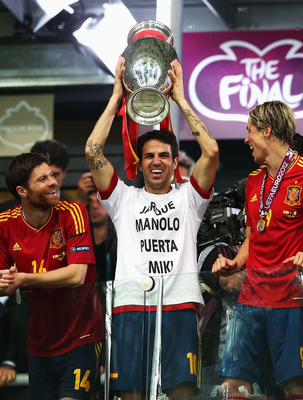
Alex Grimm/Getty Images
After yet another win and yet another title for Spain, the records are falling like a Sergio Busquets flop in the midfield.
To wit:
- Spain were only the third team to reach two Euro finals in a row. Neither of the other two—West Germany in 1976 and the Soviet Union in 1964—won their second final, and neither is even a country anymore either.
- Only one reigning World Cup champion had won the European Championship (France took Euro 2000 after winning World Cup 1998) before Sunday. Make that two.
- Under the current format, Spain were the first team to win a Euro final by fielding the same lineup in the final as their first match of the tournament (via Opta).
- Italy had not trailed any opponent for any amount of time at Euro 2012 before Sunday. Then Spain put four past them.
And, of course, no national team had ever won three straight major tournaments before Spain. Now, we've seen history.
But just how much?
The current Spain squad is currently a hot choice as the best team of all time. Brazil's 1970 World Cup team would certainly have something to say about that, but this much seems certain:
This is international football's greatest dynasty of all time। Full stop.
Tournament of the Header
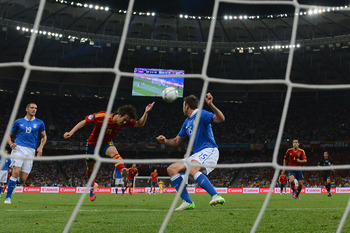
Shaun Botterill/Getty Images
This is something we'd already known for some time, but the final provided further proof.
Euro 2012 was the tournament of the header, and David Silva's headed goal in the 14th minute only confirmed it.
As Opta reports, Silva's headed goal was the 22nd of the tournament, far and away a record।
Quickfire Roja
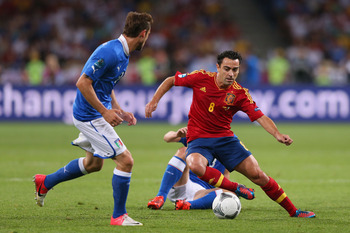
Alex Livesey/Getty Images
Forget the idea that Spain can only do things slowly, from starting slowly to passing slowly to building slowly to scoring—beautifully, to be sure—after long, slow passages of play.
David Silva scored in the 14th minute, and the only reason the breakthrough didn't come sooner was because Xavi didn't hit the target a few minutes before then.
In short, Spain started quickly, with sharp, swift touches across the pitch. Far from the ponderous start they showed against Portugal, Spain took the initiative against Italy with a breathtaking show of flowing, attacking football.
Boring, boring Spain? Hardly।
Taking Care of Pirlo
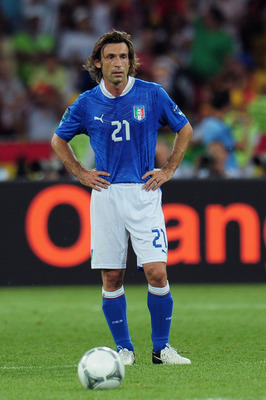
Shaun Botterill/Getty Images
Midfielder Andrea Pirlo was Italy's most important player during the tournament. When Spain shut him down, the Azzurri were always going to struggle.
For the first five matches of Italy's Euro 2012 run, Pirlo pulled the strings from his deep-lying playmaker position. He was superb against England in the quarterfinals and Germany in the semis, orchestrating nearly every attack with his passing, vision and movement on and off the ball.
Everything changed against Spain.
Spain pressured Pirlo intensely in the final, forcing him to pass almost as soon as he received the ball. As a result, Italy struggled to gain a foothold until midway through the first half.
The Azzurri did create chances, but with Pirlo limited, they were scattered।
Team Concept. Important Individuals
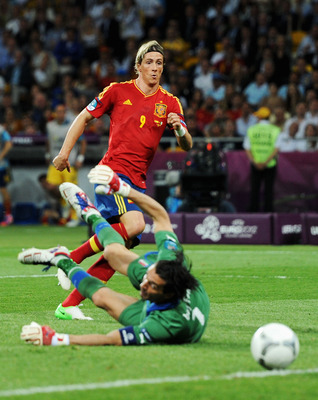
Jasper Juinen/Getty Images
Pundits, fans and commentators drool over Spain's team-oriented approach, and for good reason. For a team that just won an unprecedented third straight major international title, Spain's roster is remarkably devoid of egos.
It's either that, or manager Vicente del Bosque has done an astonishing job of dealing with them all.
Either way, Spain's achievement is staggering because of the staggering contributions of several individuals.
A few examples:
- Midfielder Cesc Fabregas played center forward in Del Bosque's experimental sides and responded with two goals in the group stage and an assist in the final.
- David Silva had a hand in a whopping five goals, two as a scorer and three as the final passer.
- Xavi, the team's heartbeat in midfield, supplied two assists in the final, giving him three in Euro finals for his career (he assisted Fernando Torres' winning goal against Germany in 2008). He is the first player to assist goals in two Euro finals.
- And most surprising of all, Fernando Torres won the Golden Boot as the tournament's top scorer with three goals, one assist and less time on the pitch than Germany's Mario Gomez। He has now scored in two finals, another first.
Scary Spain
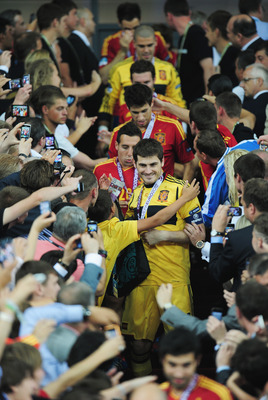
Shaun Botterill/Getty Images
As good as Spain were this summer, the future might be even brighter. Consider the following pieces of information.
Spain played without two injured stars, defender Carles Puyol and attacker David Villa. They won the tournament anyway, scoring 12 goals, allowing only one and refusing to concede for more than 500 minutes after the Group C-opening 1-1 draw against Italy.
Juan Mata, perhaps the most creative player at Chelsea, barely played, making only a late cameo as a sub versus Italy.
Fernando Llorente, at times unstoppable for Athletic Bilbao last season, did not play at all.
The team's biggest stars are hardly graybeards. Captain Iker Casillas is 31, still relatively young for a goalkeeper. Gerard Pique is 25, Sergio Ramos 26 and Jordi Alba 23.
Xavi is 32, but should have enough in the tank for another World Cup run. David Silva is 26, Cesc Fabregas 25, Andres Iniesta 28 and Xabi Alonso 30.
Make no mistake: This team will be back, and they're far from finished winning matches।
Vindication for Vicente
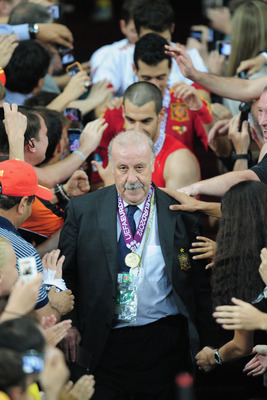
Shaun Botterill/Getty Images
Ridiculed, second-guessed and questioned at every turn, Spain manager Vicente del Bosque entered Euro 2012 as something of a question mark for La Roja.
Critics panned his experimental tactics and derided him as foolish tinkerer.
What, then, will they say now? How will they view Spain's crushing win over Italy?
It was, after all, a victory secured by sticking to Del Bosque's guns.
No comments:
Post a Comment